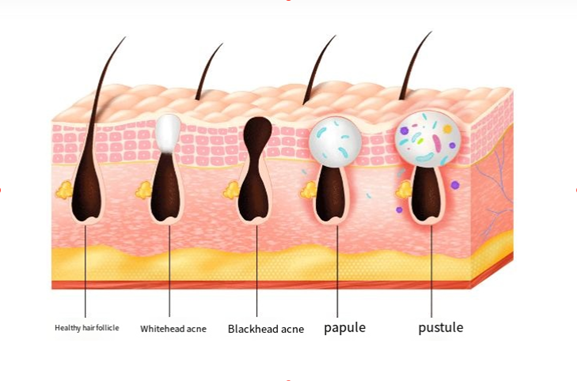Hypochlorous acid (HClO), as a kind of disinfectant, has high safety and wide application range. In the treatment of acne, slightly acidic electrolytic water is widely used due to its natural source, low toxicity, and broad-spectrum antibacterial properties. According to a number of studies and clinical observations, HCLO not only has anti-inflammatory properties, but also can quickly kill bacteria, especially on propionibacterium acnes (the main bacteria causing acne) has a strong inhibitory effect. Studies have shown that biotype hypochloric acid can effectively treat mild to moderate facial inflammatory acne, and no local adverse events have occurred during the use of the treatment, the effect is comparable to that of traditional treatment.
In addition, HOCL through its strong oxidation, fights bacteria that cause pore blockage and acne, accelerates wound healing and repairs damage, and has good anti-inflammatory, antibacterial and anti-itch effects. These properties make hypochlorous acid an effective topical acne treatment.
However, it is important to note that although hypochlorous acid is widely used in skin care, the irritability and instability of its sodium solution on the skin also limits its scope of application. Therefore, when using anolyte products, it is recommended to carry out under the guidance of a doctor to ensure safety and effectiveness.
Hypochlorous acid is an effective acne treatment, with anti-inflammatory, bactericidal and accelerate the healing of multiple effects, but in the process of use need to pay attention to the choice of products and use methods.
What is the specific mechanism of hypochlorous acid treatment of acne?
- Antibacterial effect: Hypochlorous acid has a rapid bactericidal ability for propionibacterium acnes, which is the main bacteria that causes acne. Hypochlorous acid effectively kills bacteria by destroying their organic polymers such as proteins, nucleic acids and enzymes.
- Anti-inflammatory effect: Hypochlorous acid has significant anti-inflammatory properties, which can reduce inflammatory and non-inflammatory lesions. Clinical studies have shown that the use of hypochlorous acid solutions and gels can significantly reduce the proportion of inflammatory and non-inflammatory lesions.
- Endogenous substances: Hypochlorous acid is an endogenous active antibacterial factor that can be quickly broken down into water and chlorine, so it has a very high safety and is suitable for children and pregnant women.
The application and safety assessment of hypochlorous acid products in skin care are as follows:
Application:
Hypochlorous acid/slightly acidic electrolytic water is a powerful oxidizing agent that effectively fights bacteria that cause pore clogging and acne, speeding up wound healing and repairing damage. It is widely used in the medical field to treat acne and other skin diseases.
HOCL can fight inflammation, eczema and psoriasis, and help the skin return to a healthy state. Hypochlorous acid is also used in oral mucosa, eye and nose care, and wound care products.
Hypochlorous acid is very gentle on the skin, similar to the response of the human immune system, and does not cause excessive irritation to the skin. This makes hypochlorous acid a safe skin care ingredient.
Security assessment:
Acute toxicity test on mice showed a high LD50 value, indicating a low acute toxicity.
The rabbit skin irritation test showed that hypochlorous acid solution had no obvious skin irritation reaction in a certain period of time.
Third party testing institutions have conducted a variety of safety tests on the hypochlorous acid series products to ensure their safety during use.
HOCL has been widely used in the market, and through the strict market sales analysis, the results show that it is safe to use in the population.
Despite the safety of hypochlorite, sodium hypochlorite solution is mildly irritating to the skin, and prolonged or high concentration exposure may cause skin allergies or inflammation.
How to properly use hypochlorous acid products to avoid irritation to the skin?
The following points can be referred to:
- Diluted concentration: It is usually necessary to dilute the concentrated anolyte solution to a suitable concentration to ensure safe and effective disinfection. Hypochlorous acid with appropriate concentration has no damage to the skin mucosa, and can be reduced to salt and water after sterilization, which can be rapidly degraded without residue.
- Good ventilation: When using HOCL for disinfection, ensure that the working area is well ventilated to reduce hypochlorous acid irritation to the respiratory tract.
- Avoid direct spraying: Although hypochlorous acid has a powerful disinfection and sterilization effect, it is not suitable for direct spraying on the human body, because it has a certain irritating and corrosive, if the concentration is too high or improper use, it may cause irritation and damage to the skin and respiratory tract.
- Protective measures: When using hypochlorous acid disinfectant, please take appropriate safety measures, such as wearing gloves, masks, etc., to protect yourself from direct contact with hypochlorous acid.
- Suitable for: HCLO close to human pH value, mild, no irritation, colorless and tasteless, high safety, can directly contact the skin, the old and young, pregnant women, sensitive muscles are suitable.
BLUEWAV’s hypochlorous acid spray is a new type of non-antibiotic antibacterial agent, which has a very wide range of uses in the care of bacterial skin diseases, acne and other diseases. It can effectively kill many pathogens, relieve inflammation, prevent and control skin infections. No hormones, no stimulation, no pigment, easy to use, its high efficiency and safety make it a health care tool worth promoting in medical institutions.



